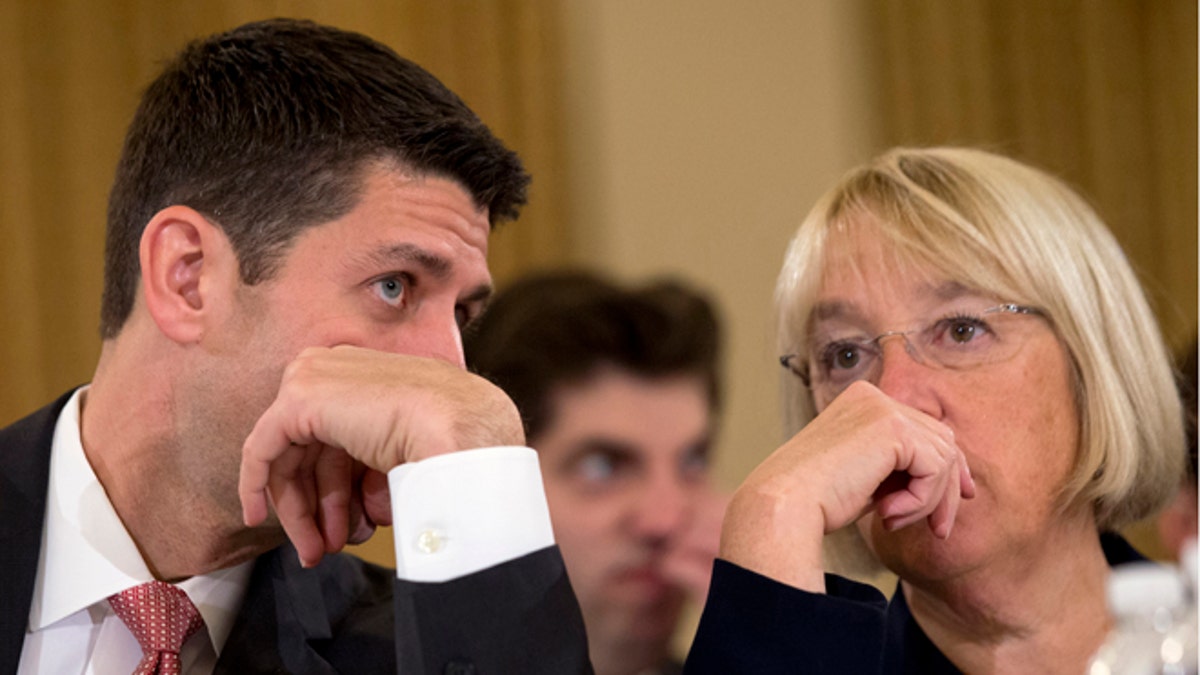
FILE: Nov. 13, 2013: House Budget Committee Chairman Rep. Paul Ryan, R-Wis., with Senate Budget Committee Chair Sen. Patty Murray, D-Wash. on Capitol Hill, in Washington, D.C. (AP)
House Budget Committee Chairman Paul Ryan on Sunday defended his compromise budget deal that avoids another potential government shutdown but suggested congressional Republicans will be more demanding of Democrats during the upcoming debit-limit talks.
“We as a caucus -- along with our Senate counterparts -- are going to meet and discuss what it is we’re going to want out of the debt limit,” the Wisconsin Republican told “Fox News Sunday.” “We don’t want nothing out of this debt limit. We’re going to decide what it is we’re going to accomplish out of this debt-limit fight.”
One key issue is when the government will hit the borrowing ceiling because the limit is based on spending and tax-revenue projections, which could put the deadline as far back as next spring or summer.
“The timing of this is very much in doubt,” Ryan said. “We’re going to meet in our retreats after the holidays and discuss exactly what it is we’re going to try to get for this.”
The two-year plan he brokered last week with Senate Budget Committee Chairwoman Patty Murray passed the House 332-94, despite strong opposition from such conservative groups as the Heritage Foundation and Tea Party favorite Sen. Marco Rubio, R-Fla.
“We didn't get everything we wanted,” Murray told NBC’s “Meet the Press.” “But I'll tell you what we did get is certainty for the next couple years.”
The Democrat-controlled Senate is scheduled to take a final vote this week on the proposal. Federal funding runs out Jan. 15.
In the face of criticism that he and House Speaker John Boehner are not true fiscal conservatives, Ryan defended the Tea Party movement and its message of less government and no tax increases.
“Two thirds of the House conservatives voted for this,” Ryan said. “I see the Tea Party as indispensable, invaluable in helping keep the taxpayer in the game, keeping Washington accountable.”
He tried to explain Boehner’s frustration with Tea Party conservatives by saying he “just got his Irish up.”
The Ryan-Murray deal raises spending limits by $62 billion in fiscal 2014 and 2015 to take the edge off the across-the-board cuts, known as a sequester, due to take effect in mid-January.
Ryan acknowledged again that the deal is not everything he wanted and that nearly sending the country over the so-called “fiscal cliff,” as Congress did earlier this year, would hurt House members facing re-election in 2014.
“I’m not trying to over-sell this as an enormous budget accomplishment,” he told Fox News. “It’s not. But it’s important that it prevents government shutdowns. It’s important that it rejects tax increases.”
The agreement sets only the overall spending targets for domestic and defense programs: $1.012 trillion in the current fiscal year, which is more than the $986 billion provided in 2013. Spending this year would have been even lower -- $967 billion -- had the sequester cuts taken effect. Under the deal, it would increase to $1.014 trillion in the year starting next Oct. 1.
To offset the $62 billion spending increase, the budget deal includes $85 billion in fee hikes and other deficit-reduction measures. That means the deal as a whole produces a net reduction in the deficit of $23 billion over 10 years.
Those offsets include cuts in federal workers' and military pensions, and increases in fees charged to airline passengers. That could be the end of Congress' deficit reduction efforts until after the 2014 elections.
The Associated Press contributed to this report.











































